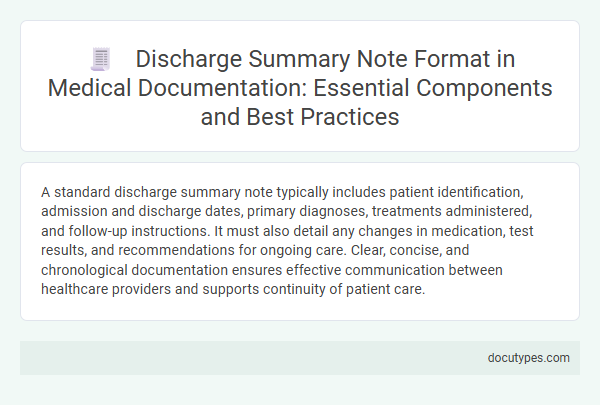A standard discharge summary note typically includes patient identification, admission and discharge dates, primary diagnoses, treatments administered, and follow-up instructions. It must also detail any changes in medication, test results, and recommendations for ongoing care. Clear, concise, and chronological documentation ensures effective communication between healthcare providers and supports continuity of patient care.
Introduction to Discharge Summary Notes
A discharge summary note is a critical medical document that outlines a patient's hospital stay and treatment details. It serves as a concise record for healthcare providers to ensure continuity of care after discharge. The standard format typically includes patient information, diagnosis, treatment summary, and follow-up instructions.
Importance of Accurate Discharge Documentation
What is the standard format for writing a discharge summary note? A discharge summary must include patient identification, admission and discharge dates, diagnosis, treatment provided, and follow-up instructions. Accurate discharge documentation ensures continuity of care and reduces the risk of medical errors after hospital discharge.
Patient Identification and Demographics
The standard format for writing a discharge summary note begins with clear patient identification and demographics to ensure accurate record keeping. This section typically includes the patient's full name, date of birth, medical record number, and contact information.
Accurate demographic details such as age, sex, race, and address are crucial for proper patient follow-up and continuity of care. These identifiers help healthcare providers and institutions maintain consistency across medical documents and prevent errors in patient management.
Hospital Course and Clinical Summary
The standard format for writing a discharge summary note includes distinct sections, with the hospital course and clinical summary being crucial components. The hospital course details the patient's progress, treatments, and interventions during the hospital stay, highlighting significant changes in condition and responses to therapy. The clinical summary provides a concise overview of the diagnosis, key clinical findings, and rationale for discharge, ensuring continuity of care for subsequent providers.
Key Diagnoses and Problem List
The standard format for writing a discharge summary note includes a clear and concise presentation of key diagnoses and a comprehensive problem list. Accurate documentation ensures effective communication between healthcare providers and supports quality patient care.
The key diagnoses section highlights the primary medical conditions treated during the hospital stay, emphasizing their relevance to the patient's discharge plan.
- Key Diagnoses - List of the main medical conditions identified and managed during the hospitalization, often prioritized by severity and relevance.
- Problem List - Detailed enumeration of both active and resolved problems affecting the patient, including underlying chronic conditions and complications.
- Format Consistency - Use of standardized medical terminology and clear categorization to facilitate continuity of care and future medical reference.
Procedures and Interventions Performed
| Section | Description | Key Elements |
|---|---|---|
| Procedures and Interventions Performed | Detailed account of all medical procedures and clinical interventions conducted during the patient's admission. |
|
Discharge Medications and Instructions
The standard format for writing a discharge summary note includes a detailed section on discharge medications and instructions to ensure patient safety and continuity of care. Clear communication about medications helps prevent errors and supports effective treatment after leaving the hospital.
- Discharge Medications - Lists all prescribed medications, including dosages, frequency, and duration.
- Medication Changes - Notes any changes from previous prescriptions, highlighting new, discontinued, or adjusted drugs.
- Instructions for Use - Provides specific guidance on how and when to take each medication, along with potential side effects to monitor.
Your discharge summary ensures that healthcare providers and patients have accurate information for continued care.
Follow-Up Plans and Appointments
The standard format for writing a discharge summary note includes a clear section dedicated to follow-up plans and appointments. This section outlines specific instructions for ongoing care and schedules necessary follow-up visits with healthcare providers.
Follow-up plans should specify the type of specialist or primary care physician to be seen, along with recommended timelines. Detailed appointment information ensures continuity of care and helps prevent readmission or complications after discharge.
Common Documentation Pitfalls to Avoid
A discharge summary note serves as a crucial medical document summarizing a patient's hospital stay and care. Understanding the standard format helps ensure clarity and continuity of care while avoiding common documentation errors.
- Incomplete patient information - Omitting key identifiers like full name, date of birth, or medical record number can lead to confusion and treatment delays.
- Lack of clear clinical summary - Failing to concisely describe the admission reason, diagnosis, procedures, and treatment outcomes diminishes the note's effectiveness.
- Missing follow-up instructions - Not including detailed recommendations for ongoing care, medications, and referrals hinders your patient's recovery plan.
What Is the Standard Format for Writing a Discharge Summary Note? Infographic

